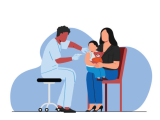Aug 29, 2012
Meta-analysis: MDR-TB may require more drugs for longer periods
The use of specific drugs, the use of a greater number of effective drugs, and longer treatment times may be tied to greater treatment success and survival in patients who have multidrug-resistant tuberculosis (MDR-TB), according to a meta-analysis of more than 9,000 patients in PLoS Medicine yesterday. A large international team of scientists identified treatment outcomes of microbiologically confirmed MDR-TB patients in three recent systematic reviews. Using patient data from the review authors, the team estimated adjusted odds ratios for 9,153 patients. They found that the use of later-generation quinolones, ofloxacin, and ethionamide/prothionamide as part of multidrug regimens were all associated with treatment success, as were the use of four or more likely effective drugs during the initial intensive treatment phase or three or more such drugs during the continuation phase. The researchers also found that, among patients who did not die or stop treatment, the odds of treatment success increased with the duration of the initial treatment phase up to 7.1 to 8.5 months and with the total duration of treatment up to 18.6 to 21.5 months. They concluded, however, that "randomized trials are urgently needed to optimize MDR-TB treatment."
Aug 28 PLoS Med meta-analysis
HHS announces $48 million in public health funding
Health and Human Services (HHS) Secretary Kathleen Sebelius today announced $48 million in Affordable Care Act funds to help strengthen the US public health workforce and fight disease, the agency said in a press release. Included in the awards is $23 million in grants to 37 Public Health Training Centers to train current and future public health workers in key areas like nutrition and epidemiology and to enhance basic public health skills. The Centers for Disease Control and Prevention (CDC) is awarding $25 million to support fellowship programs and placement of fellows in state and local public health departments and to expand training programs for current public health workers, focusing on e-learning. "These investments are part of our work to promote public health, and they will help strengthen our efforts to fight disease and illness before they happen," Sebelius said in the release. A year ago HHS announced $40 million in similar funding.
Aug 29 HHS news release
Sep 1, 2011, CIDRAP News Scan on last year's funding
Colorado girl contracts plague
A 7-year-old girl from Archuleta County, Colo., has contracted septicemic plague from contact with a dead wild animal, according to Pro-Med Mail, the disease-reporting service of the International Society for Infectious Diseases. She presented to a small-town emergency department with a fever of 107ºF and seizures on Aug 24 but was transported to a pediatric intensive care unit in Denver. While there she went into severe septic shock and remains in critical condition, according to the report yesterday. Blood cultures confirmed Yersinia pestis. Her infection is the state's first plague case since 2006 and the first in Archuleta County since 1998, according to an article in the Denver Post. The girl contracted the disease at a San Juan National Forest campground northwest of Pagosa Springs, according to the article.
Aug 28 Pro-Med Mail post
Aug 28 Denver Post article





















